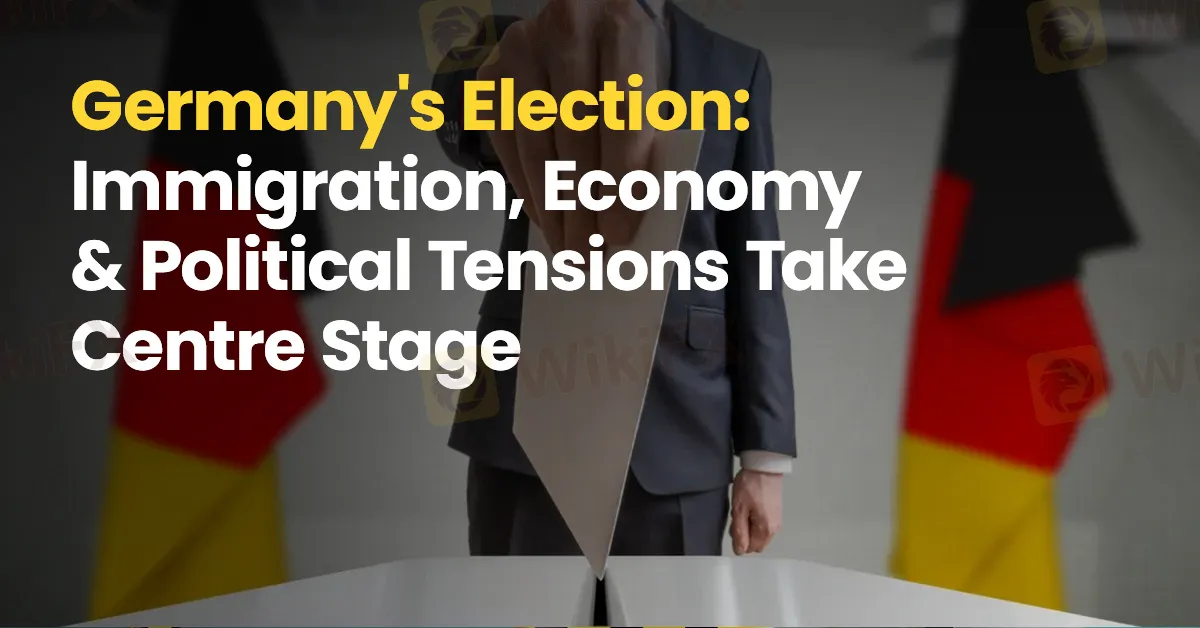简体中文
繁體中文
English
Pусский
日本語
ภาษาไทย
Tiếng Việt
Bahasa Indonesia
Español
हिन्दी
Filippiiniläinen
Français
Deutsch
Português
Türkçe
한국어
العربية
Germany's Election: Immigration, Economy & Political Tensions Take Centre Stage
Abstract:Germany is set to hold a crucial general election on 23 February 2025, with voter frustration over migration emerging as a dominant issue.

Germany is set to hold a crucial general election on 23 February 2025, with voter frustration over migration emerging as a dominant issue. The centre-right Christian Democrats (CDU) currently lead the polls with approximately 29% support, positioning party leader Friedrich Merz as the frontrunner to succeed Chancellor Olaf Scholz. Meanwhile, the far-right Alternative for Germany (AfD), a party under scrutiny by domestic intelligence services for suspected extremist ties, has gained significant traction, securing 21% of voter support.
AfD's rise has been largely driven by its firm stance on migration policies. The party argues that the German government has failed to differentiate between asylum seekers and economic migrants, leading to what it describes as a decade-long influx of illegal migration. Political analysts note that AfD's increasing support correlates with its radicalisation, resonating with sections of the electorate that favour stricter immigration controls. Additionally, the party has taken a strong stance against Germanys environmental transformation policies and maintains a pro-Russian position, opposing military aid to Ukraine.
The partys policies have drawn international attention, including an endorsement from billionaire entrepreneur Elon Musk, who claimed that AfD was the only party capable of “saving Germany.” Musk further criticised attempts to label the party as extremist, pointing to the background of AfD co-leader Alice Weidel, who has a same-sex partner from Sri Lanka. His comments, published in a German newspaper, sparked further debate, and he later hosted a live discussion with Weidel on his social media platform.

Recent terrorist attacks in Germany have intensified national debates on migration, shifting electoral discussions away from previous campaign priorities such as climate change. Experts note that the heightened focus on immigration marks a stark contrast to the 2021 election, where environmental policies took centre stage.
Despite its growing support, AfD continues to face significant opposition from many Germans. Widespread protests have taken place in cities such as Berlin, where demonstrators rallied against the partys far-right ideology.

While migration remains a focal point of the campaign, the cost-of-living crisis remains a major concern for voters. Germany, Europe‘s largest economy, continues to grapple with inflation, worsened by its previous dependence on inexpensive Russian energy. The country’s automotive sector faces mounting pressure from Chinese competitors, while potential U.S. import tariffs and demands for increased defence spending add to economic uncertainty.
These pressures contributed to the collapse of the three-party coalition government in November. Chancellor Scholz has proposed increasing borrowing to address a €24 billion budget shortfall and fund military aid for Ukraine. However, Merz and the CDU argue against further debt accumulation, advocating instead for policies aimed at stimulating economic growth.

Although the CDU is expected to win the election, polls suggest it will fall short of an outright majority. Merz has ruled out forming a coalition with AfD, despite previously relying on the partys support for parliamentary motions on immigration policy. The so-called “firewall” policy, a post-World War II strategy aimed at excluding far-right parties from governance, remains a central feature of German politics.
Internationally, this approach has drawn criticism, notably from U.S. Vice President JD Vance, who, in a speech at the Munich Security Conference, warned against excluding political groups from democratic processes. His remarks, followed by a meeting with Weidel, were met with bipartisan rejection from mainstream German politicians. Chancellor Scholz condemned what he described as “American interference” in Germanys democratic processes, while Merz voiced concerns over U.S. encroachments on European politics.

Disclaimer:
The views in this article only represent the author's personal views, and do not constitute investment advice on this platform. This platform does not guarantee the accuracy, completeness and timeliness of the information in the article, and will not be liable for any loss caused by the use of or reliance on the information in the article.
Read more

BlackBull: A Closer Look at Its Licenses
When selecting a broker, understanding its regulatory standing is an important part of assessing overall reliability. For traders seeking to protect their capital, ensuring that a platform operates under recognised and stringent oversight can make all the difference. Keep reading to learn more about BlackBull and its licenses.

Dark Side of AETOS: They Don’t Want You to Know
AETOS is an Australia-based broker. All over the internet, you will find positive reviews about this broker, but no one is talking about the risks involved with AETOS. However, we have exposed the hidden risks associated with AETOS

Contemplating Investments in Quotex? Abandon Your Plan Before You Lose All Your Funds
Have you received calls from Quotex executives claiming to offer you returns of over 50% per month? Do you face both deposit and withdrawal issues at this company? Or have you faced a complete scam trading with this forex broker? You're not alone. Here is the exposure story.

15 Brokers FCA Says "Are Operating Illegally" Beware!
If a reputable regulator issues a warning about unlicensed brokers, it's important to take it seriously — whether you're a trader or an investor. Here is a list you can check out- be cautious and avoid getting involved with these scam brokers.
WikiFX Broker
Latest News
Scam Alert: Revealing Top Four Forex Scam Tactics Employed to Dupe Investors
Meta says it won't sign Europe AI agreement, calling it an overreach that will stunt growth
Ether and trading stocks take the crypto spotlight as Congress passes historic stablecoin bill
Inflation outlook tumbles to pre-tariff levels in latest University of Michigan survey
Peter Thiel-backed cryptocurrency exchange Bullish files to go public on NYSE
What a Trump, Powell faceoff means for your money
Ether takes crypto spotlight as Congress passes historic stablecoin bill
Lead Prices Remain in the Doldrums Despite Seasonal Expectations
Myanmar Tin Ore Shipments from Wa Region Set to Resume
Major U.S. Banks Plan Stablecoin Launch Amid Crypto Regulations
Currency Calculator


